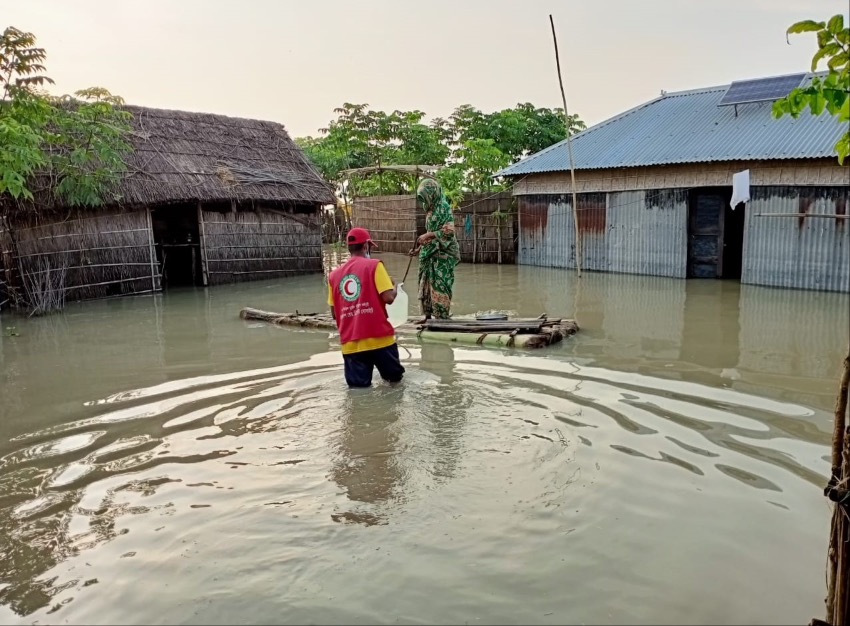Red Cross Red Crescent: Humanitarian sector joins forces to tackle ‘existential threat’ of climate change

Geneva, 22 June 2021 – The humanitarian sector has a key role to play in addressing the climate and environment crises that affect people’s lives and livelihoods around the world every day. This means walking the talk in terms of integrating climate smart approaches into its work and greening its own operations. The Red Cross Red Crescent Movement invites all humanitarian organizations to sign the Climate and Environment Charter for Humanitarian Organizations, already adopted by 27 organizations since its launch a month ago.
The Charter, which aims to foster a strong commitment to climate action across the humanitarian community, is designed for all humanitarian organizations – large and small. It was developed by the International Committee of the Red Cross (ICRC) and the International Federation of Red Cross and Red Crescent Societies (IFRC), with the support of an advisory committee and in consultation with the humanitarian sector. It intends to guide both the humanitarian sector’s approach the increasing risks resulting from climate change and to address its own carbon and environmental footprint.
“Climate change is an existential threat to humanity, and the entire humanitarian sector needs to take it very seriously. Climate-affected communities across the world understand the scale of the threat, and so do the Red Cross and Red Crescent volunteers and staff who work alongside them every day. Much more needs to be done to reduce the risks communities are facing, to help them to build their resilience and adapt to climate shocks and to ensure that humanitarian organizations are reducing their own environmental impacts,” said Mr Jagan Chapagain, Secretary General of the IFRC.

Today’s climate and environmental crises affect all dimensions of our lives, from our physical and mental health to our food, water and economic security. While the crises are affecting everyone, those hit the hardest are the poorest and most marginalized communities, whose capacity is already strained and who have often contributed least to the problem. And the situation is only getting worse.
“We have no time to lose. We have a responsibility to come together, as a humanitarian community, to strengthen our expertise and develop adequate responses to the climate and environmental crises. Joining forces is critical if we want to reduce their impacts on the most vulnerable people,” said ICRC’s Director General Robert Mardini.
Radical transformation is urgently needed to prevent further death and suffering. Analysis by the IFRC[1] found that 97.6 million people were affected by climate- and weather-related disasters in 2019. Protecting the lives and rights of present and future generations depends on political action to cut emissions, halt environmental degradation, and adapt to increasing risks.

“The climate crisis is impacting humanitarian action around the world, and we must urgently step-up and increase our collective efforts to address this challenge. As a network, at ICVA’s 18th General Assembly, we signed on to the Climate and Environment Charter for Humanitarian Organizations. ICVA encourages others to sign and implement jointly as our ability to partner is our most strategic capability,” said Ignacio Packer, Executive Director, International Council of Voluntary Agencies (ICVA).
The Climate and Environment Charter for Humanitarian Organizations is a document for and by humanitarian organizations, intended to help them play their part and highlight their relevance in responding to the climate and environmental crises.
The Red Cross Red Crescent Movement aims to gather a large number of signatures ahead of the UN Climate Change Conference (COP26) in November 2021 to signal the strong commitment of the humanitarian community to scaling up its response to the climate and environment crises.
The Charter is open for signature here.
[1] IFRC World Disasters Report 2020 : Come Heat or High Water
For more information, contact:
IFRC
Caroline Haga, +358 50 598 0500, caroline.haga@ifrc.org
ICRC
Aurélie Lachant, +41 79 244 64 05, alachant@icrc.org
About IFRC
IFRC is the world’s largest humanitarian network, comprising 192 National Red Cross and Red Crescent Societies working to save lives and promote dignity around the world. www.ifrc.org - Facebook - Twitter - YouTube
About ICRC
Established in 1863, the ICRC operates worldwide, helping people affected by conflict and armed violence and promoting the laws that protect victims of war. An independent and neutral organization, its mandate stems essentially from the Geneva Conventions of 1949. www.icrc.org - Facebook - Twitter - YouTube
For media inquiries, please contact Eva Oyón on: eva.oyon@redcross.eu or +32 2 235 09 22

